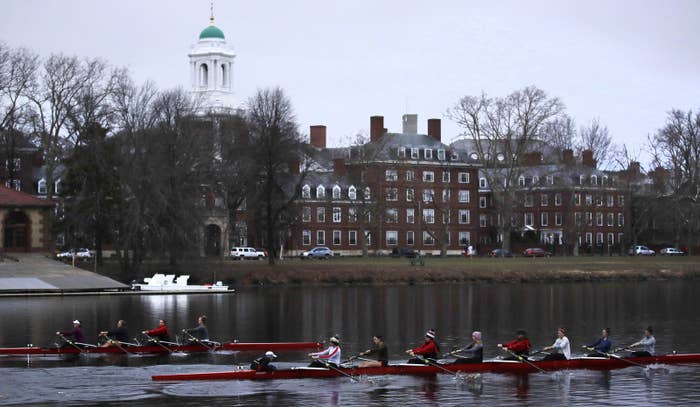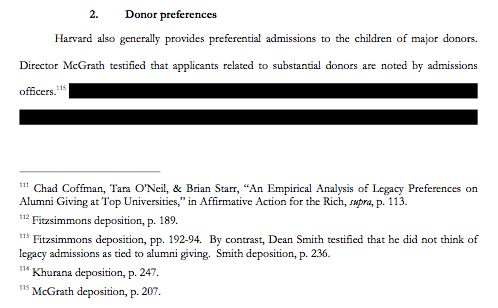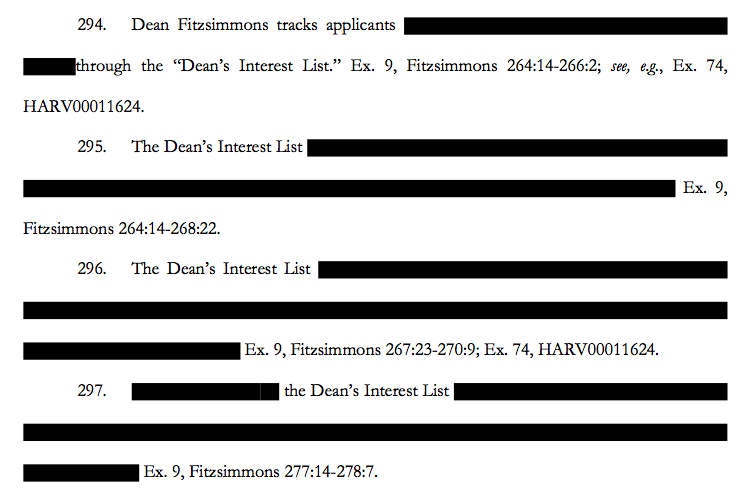
Harvard requested that information about how the university treats relatives of top donors in its admissions process be retracted from legal filings, blacking out the details of a secretive “Dean’s Interest List” and redacting testimony from admissions officers that appears to discuss the school's handling of donors.
The filing, made Friday by a group that that alleges Harvard discriminates against Asian Americans, lays bare some of the details from Harvard’s secretive admissions process, including how the elite college allegedly gives students advantages based on things like race, class, and legacy status.
Thanks to Harvard's redactions of the filing, however, there is no reference to whether or how the school gives an advantage to the children and other relatives of top donors. A person with knowledge of the case said that Harvard had requested the redactions.
An exhibit in the filing's footnotes, which were filed by the plaintiff and also made public on Friday, explicitly references the admissions preference given to relatives of donors to the school, as well as testimony from admissions officers about how the school tracks top donors' relatives.
A spokesperson said that Harvard requested redactions only to protect the privacy and personal information of students and other individuals.
The main filing from the group Students for Fair Admissions includes five sections that detail the types of advantages, or “tips,” that students gain in Harvard’s admissions process, including “The Use of Legacy Status in the Admissions Process,” “The Use of Staff and Faculty Preferences in the Admissions Process,” and “The Use of Athletic Ability in the Admissions Process.”
Harvard apparently asked for the redaction of a key detail from one section, leaving a header that reads only, “The Use of [Redacted] in the Admissions Process.”

The contents of that section — more than any of the others on admissions "tips" — are almost entirely redacted, except for references to a secretive “Dean’s Interest List.” Harvard scrubbed all information about the nature of the list from the filing.
But the largely blacked-out part of the filing cites a section called “Donor Preferences" from an attached exhibit. That section, an expert report filed by Students for Fair Admissions, reads, “Harvard also generally provides preferential admissions to the children of top donors."
The exhibit, left mostly unredacted, also includes references to depositions given by Harvard admissions officers, including one, Marlyn McGrath, who “testified that applicants related to substantial donors are noted by admissions officers."
Here's part of the exhibit

The same page of McGrath's deposition (207) is cited, in redacted form, in the main filing, under the header “The Use of [Redacted] in the Admissions Process.”
Both the "Donor Preferences" section of the exhibit and the original, redacted filing cite the same page (275) of testimony from Harvard Dean of Admissions William Fitzsimmons.
Here's the some of the redacted filing that cites the exhibit

Harvard refused to provide any specifics to BuzzFeed News about how applicants were selected for the Dean's Interest List, saying that it is “simply a list of applicants that the Dean of Admissions notes during the admissions cycle" and that students on it receive the same scrutiny as other applicants. While the list appears to reference donors' relatives, it could also include other types of applicants.
Students for Fair Admissions’ filing also references another little-known list used in Harvard admissions, called the “Z-List” — a group of students who are admitted to Harvard but asked to take a gap year before enrolling, in a practice that has been called a "side door" to the elite university.
Though half of Harvard’s admitted students are people of color, 70% of students on the Z-List are white, and almost 50% of them are Harvard legacies; just 1.2% were economically disadvantaged. Their stats, according to Students for Fair Admissions, were generally significantly lower than those of regularly admitted students.
Harvard told BuzzFeed News that students on the list “go through the same rigorous admissions process as all other applicants," and said in the filing it intentionally doesn't put disadvantaged students on the Z-List because they would have a more difficult time filling a gap year.
Students for Fair Admissions found that nearly 60% of students on the Z-List were also on the Dean’s Interest List.
